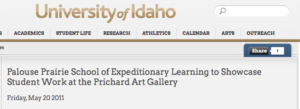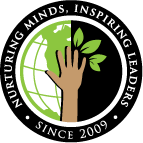 MOSCOW, Idaho – The Prichard Art Gallery’s next exhibit will feature altered books on water quality by fifth and sixth graders from the Palouse Prairie School of Expeditionary Learning. The exhibit will run Tuesday, May 24, through Tuesday, June 7. A reception will be held Tuesday, May 24, from 6-8 p.m. at the Prichard Art Gallery.
MOSCOW, Idaho – The Prichard Art Gallery’s next exhibit will feature altered books on water quality by fifth and sixth graders from the Palouse Prairie School of Expeditionary Learning. The exhibit will run Tuesday, May 24, through Tuesday, June 7. A reception will be held Tuesday, May 24, from 6-8 p.m. at the Prichard Art Gallery.
“The gallery has a history of engaging the local student community in artistic activities,” said Roger Rowley, director of the Prichard Art Gallery. “This exhibit highlights the benefits of encouraging creative thinking, along with the sciences to investigate issues that affect our daily lives. This is the path that will lead to solutions to the problems we face. The gallery is delighted to present work by young people modeling this approach to creative thinking and problem-solving.”
Fifth and sixth graders from Palouse Prairie spent three months learning how the artistic, scientific and communicative processes overlap. Using the interdisciplinary model, students conducted an in-depth study of the importance of water quality, threats to natural resources, community conservation efforts and the impact of poor water quality in less industrialized nations.
“Students are exposed to a myriad of different models for generating, exploring and communicating ideas,” said Dona Black, art education coordinator at the Prichard Art Gallery. “When immersed in the different processes and approaches presented for writing, research, science and art, they sometimes forget that tools and methods for one discipline can be used to make meaning in another. The students at Palouse Prairie studied water from a variety of angles and used all of their experience to communicate their findings in a unique form audiences may find more intriguing than the usual science project or written report.”
Students partnered with many local educators and artists during their three-month study, including Palouse-Clearwater Environmental Institute, McCall Outdoor Science School, artist Kim Cole and the Prichard Art Gallery.
Each book explores the guiding question, “How does water quality affect the ecology of a community?” Within that framework students chose a particular topic, like disease, the health of a local water source or how water is exported our farming products. Using the knowledge and skills local experts have shared with them and their research efforts, they have altered the book format to communicate their results.
These old books from the Moscow’s Recycle Center were altered or changed to present a new idea. Their alterations are part collage, cartography, illustration and dictation. Each book is accompanied by an artist’s statement explaining their top and aesthetic choices. The contents of the books are the artistic representation of the water quality research, real science experiments and information from the Expedition Case Studies that the students wanted to have the general public wonder about, feel inspired by, or be educated about.
“The students used the content of science to be displayed in an art form,” said Kathryn Bonzo, instructor at the Palouse Prairie School of Expeditionary Learning. “The altered book was a new difficult medium to work in and they learned so much about craftsmanship and how an artist must visualize and constantly revise a message and to make it become more real.”


Comments are closed